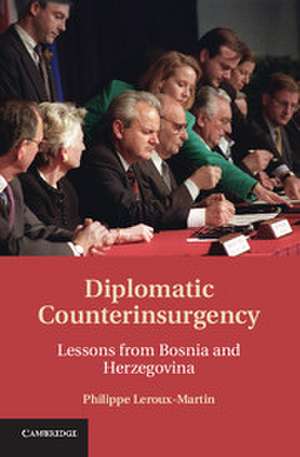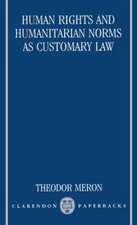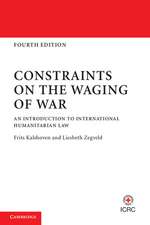Diplomatic Counterinsurgency: Lessons from Bosnia and Herzegovina
Autor Philippe Leroux-Martinen Limba Engleză Paperback – 6 mai 2015
| Toate formatele și edițiile | Preț | Express |
|---|---|---|
| Paperback (1) | 287.66 lei 6-8 săpt. | |
| Cambridge University Press – 6 mai 2015 | 287.66 lei 6-8 săpt. | |
| Hardback (1) | 728.24 lei 6-8 săpt. | |
| Cambridge University Press – 25 dec 2013 | 728.24 lei 6-8 săpt. |
Preț: 287.66 lei
Nou
Puncte Express: 431
Preț estimativ în valută:
55.05€ • 57.26$ • 45.45£
55.05€ • 57.26$ • 45.45£
Carte tipărită la comandă
Livrare economică 14-28 aprilie
Preluare comenzi: 021 569.72.76
Specificații
ISBN-13: 9781107546264
ISBN-10: 1107546265
Pagini: 336
Ilustrații: black & white illustrations
Dimensiuni: 154 x 230 x 17 mm
Greutate: 0.45 kg
Editura: Cambridge University Press
Colecția Cambridge University Press
Locul publicării:New York, United States
ISBN-10: 1107546265
Pagini: 336
Ilustrații: black & white illustrations
Dimensiuni: 154 x 230 x 17 mm
Greutate: 0.45 kg
Editura: Cambridge University Press
Colecția Cambridge University Press
Locul publicării:New York, United States
Cuprins
Part I. The Battle: 1. We fired first; 2. They fire back; 3. The battle; 4. The defeat; Part II. Reflections on the Battle: 5. Non-violent wars; 6. Non-violent insurgency; 7. Diplomatic counterinsurgency; 8. The avalanche; 9. Looking forward.
Recenzii
'This book makes a most useful and original contribution to one of the most pressing foreign affairs questions of our time. How can the international community be wiser and more successful in preventing war and creating peace after conflict? It should be required reading by all who aspire to act to suppress conflict and build sustainable peace.' Lord Paddy Ashdown, former High Representative for Bosnia and Herzegovina
'The 1995 Dayton Accords silenced the guns of war in Bosnia and Herzegovina. It also put in place an international administration that during the past few years has become unworkable. This book is an insider's account of how the Dayton process unraveled. The author also uses his Bosnia experience to provide an incisive analysis of 'non-violent wars' and the important lessons to be learnt from them. It is essential reading for all interested in the recent history of the Balkans and more generally in post-violence politics.' Justice Richard Goldstone, former prosecutor, International Criminal Tribunal for former Yugoslavia
'This fascinating and essential book catalogues the vital importance of diplomacy in the world today. Philippe Leroux-Martin gives us an insider's view of how Bosnia was put back together after the war.' Nicholas Burns, Harvard University, Massachusetts
'The vicious ethnic conflicts that tore Yugoslavia apart bloodily exposed the inability of the international community to cope with an eruption of violence even in a corner of Europe. In the aftermath, the same ethnic hatreds, fueled by suspicion and duplicity, made creating a modern, civil, society out of the wreckage of war and displacement an enormous, perhaps impossible task. Diplomatic Counterinsurgency unveils the petty politics, the behind-the-scenes confrontations and the high-stakes efforts of a handful of international advisors as Bosnians fought to re-create a nation.' Paul Koring, foreign correspondent, The Globe and Mail
'This book makes a very important contribution to our understanding of what is needed to nurture peace, stability and economic prosperity in a post-conflict environment. Drawing on the experience of Bosnia, Leroux-Martin demonstrates the interdependence of diplomacy, security and economic development in the crafting of any peace agreement and the importance of ensuring that diplomatic actors, security personnel and the international financial institutions working in the realm of economic development work together to ensure that agreements are viable, sustainable and deliver a visible 'peace dividend'. 'Must reading' for anyone engaged in fragile and conflict-affected states.' Christine I. Wallich, former World Bank Country Director for Bosnia and Herzegovina
'I recommend this excellent book to all who seek to understand how to take greater advantage of the interaction between diplomacy and the use of armed force.' General Sir Rupert Smith, author of The Utility of Force
'If you set about to lead a crisis management mission where state building and strengthening the rule of law are among your key tasks, make sure you read this book first.' Pieter Feith, former International Civilian Representative and European Union Special Representative for Kosovo
'In his brilliant analysis of how crisis management in Bosnia and Herzegovina went off the rails, Philippe Leroux-Martin turns Clausewitz's famous dictum that 'war is a continuation of politics by other means' on its head. Leroux-Martin concludes that the capacity of international interveners to counter 'non-violent wars' through diplomatic means is almost inevitably limited, and he offers a compelling alternative strategy to steer conflict. Diplomatic Counterinsurgency should be required reading for diplomats and other international crisis managers.' Michael Haltzel, Johns Hopkins University, and former advisor to US Vice President (then Senator) Joseph R. Biden, Jr
'The 1995 Dayton Accords silenced the guns of war in Bosnia and Herzegovina. It also put in place an international administration that during the past few years has become unworkable. This book is an insider's account of how the Dayton process unraveled. The author also uses his Bosnia experience to provide an incisive analysis of 'non-violent wars' and the important lessons to be learnt from them. It is essential reading for all interested in the recent history of the Balkans and more generally in post-violence politics.' Justice Richard Goldstone, former prosecutor, International Criminal Tribunal for former Yugoslavia
'This fascinating and essential book catalogues the vital importance of diplomacy in the world today. Philippe Leroux-Martin gives us an insider's view of how Bosnia was put back together after the war.' Nicholas Burns, Harvard University, Massachusetts
'The vicious ethnic conflicts that tore Yugoslavia apart bloodily exposed the inability of the international community to cope with an eruption of violence even in a corner of Europe. In the aftermath, the same ethnic hatreds, fueled by suspicion and duplicity, made creating a modern, civil, society out of the wreckage of war and displacement an enormous, perhaps impossible task. Diplomatic Counterinsurgency unveils the petty politics, the behind-the-scenes confrontations and the high-stakes efforts of a handful of international advisors as Bosnians fought to re-create a nation.' Paul Koring, foreign correspondent, The Globe and Mail
'This book makes a very important contribution to our understanding of what is needed to nurture peace, stability and economic prosperity in a post-conflict environment. Drawing on the experience of Bosnia, Leroux-Martin demonstrates the interdependence of diplomacy, security and economic development in the crafting of any peace agreement and the importance of ensuring that diplomatic actors, security personnel and the international financial institutions working in the realm of economic development work together to ensure that agreements are viable, sustainable and deliver a visible 'peace dividend'. 'Must reading' for anyone engaged in fragile and conflict-affected states.' Christine I. Wallich, former World Bank Country Director for Bosnia and Herzegovina
'I recommend this excellent book to all who seek to understand how to take greater advantage of the interaction between diplomacy and the use of armed force.' General Sir Rupert Smith, author of The Utility of Force
'If you set about to lead a crisis management mission where state building and strengthening the rule of law are among your key tasks, make sure you read this book first.' Pieter Feith, former International Civilian Representative and European Union Special Representative for Kosovo
'In his brilliant analysis of how crisis management in Bosnia and Herzegovina went off the rails, Philippe Leroux-Martin turns Clausewitz's famous dictum that 'war is a continuation of politics by other means' on its head. Leroux-Martin concludes that the capacity of international interveners to counter 'non-violent wars' through diplomatic means is almost inevitably limited, and he offers a compelling alternative strategy to steer conflict. Diplomatic Counterinsurgency should be required reading for diplomats and other international crisis managers.' Michael Haltzel, Johns Hopkins University, and former advisor to US Vice President (then Senator) Joseph R. Biden, Jr
Notă biografică
Descriere
This book provides an eyewitness account of a key political crisis triggered by the international community in Bosnia and Herzegovina in 2007.













